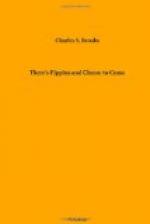Leigh Hunt’s “Rimini” the Quarterly finds to be an “ungrammatical, unauthorized, chaotic jargon, such as we believe was never before spoken, much less written.... We never,” concludes the reviewer, “in so few lines saw so many clear marks of the vulgar impatience of a low man, conscious and ashamed of his wretched vanity, and labouring, with coarse flippancy, to scramble over the bounds of birth and education, and fidget himself into the stout-heartedness of being familiar with a Lord.” In a later review, Hunt is a propounder of atheism. “Henceforth,” says the reviewer, “... he may slander a few more eminent characters, he may go on to deride venerable and holy institutions, he may stir up more discontent and sedition, but he will have no peace of mind within ... he will live and die unhonoured in his own generation, and, for his own sake it is to be hoped, moulder unknown in those which are to follow.”
Hazlitt belongs to a “class of men by whom literature is more than at any period disgraced.” His style is suited for washerwomen, a “class of females with whom ... he and his friend Mr. Hunt particularly delight to associate.”
Shelley, writes the Quarterly, “is one of that industrious knot of authors, the tendency of whose works we have in our late Numbers exposed to the caution of our readers ... for with perfect deliberation and the steadiest perseverance he perverts all the gifts of his nature, and does all the injury, both public and private, which his faculties enable him to perpetrate.” His “poetry is in general a mere jumble of words and heterogeneous ideas.” “The Cloud” is “simple nonsense.” “Prometheus Unbound” is a “great storehouse of the obscure and unintelligible.” In the “Sensitive Plant” there is “no meaning.” And for Shelley himself, he is guilty of a great many terrible things, including verbiage, impiety, immorality and absurdity.
Of Blackwood’s Magazine the special victims were Keats and Hunt and Coleridge. “Mr. Coleridge,” says the reviewer, “... seems to believe that every tongue is wagging in his praise—that every ear is open to imbibe the oracular breathings of his inspiration ... no sound is so sweet to him as that of his own voice ... he seems to consider the mighty universe itself as nothing better than a mirror in which, with a grinning and idiot self-complacency, he may contemplate the physiognomy of Samuel Taylor Coleridge.... Yet insignificant as he assuredly is, he cannot put pen to paper without a feeling that millions of eyes are fixed upon him....”
Leigh Hunt, says Blackwood, “is a man of extravagant pretensions ... exquisitely bad taste and extremely vulgar modes of thinking.” His “Rimini” “is so wretchedly written that one feels disgust at its pretense, affectation and gaudiness, ignorance, vulgarity, irreverence, quackery, glittering and rancid obscenities.”




